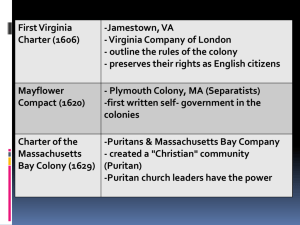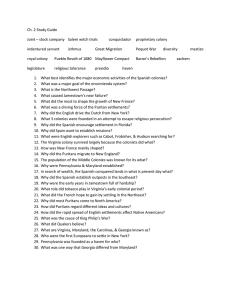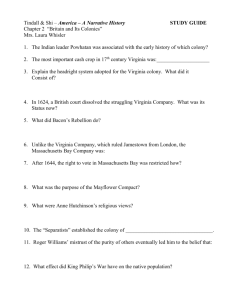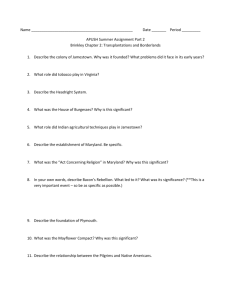England’s 17 -Century Colonies: Chesapeake, New England, Middle, & Southern Colonies
advertisement
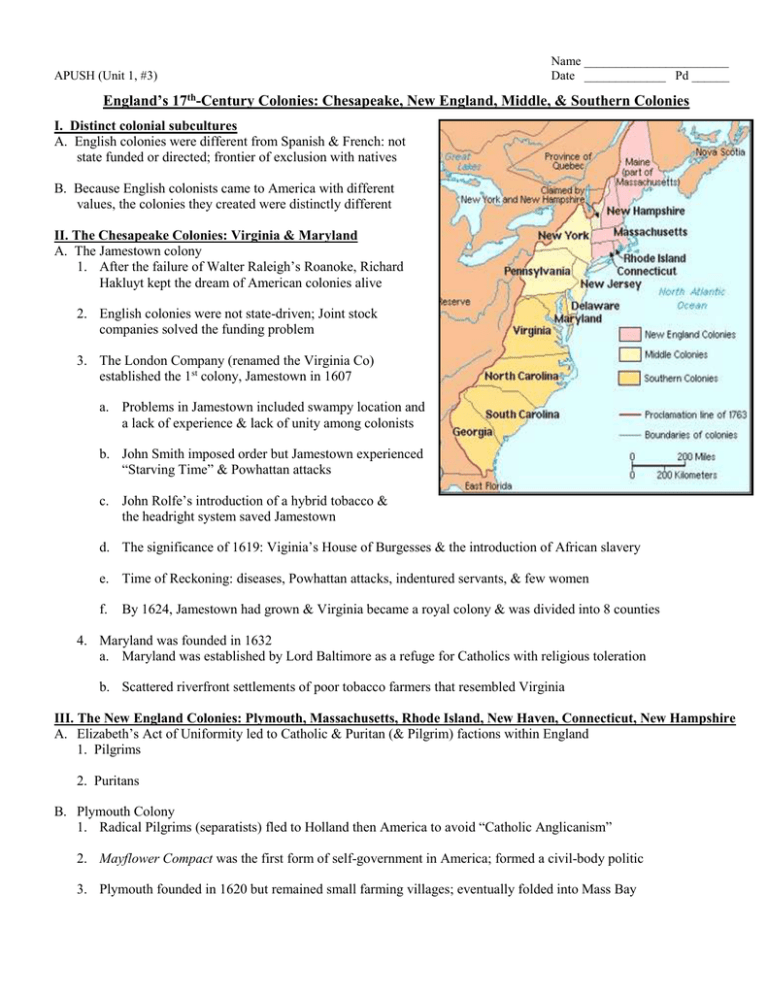
APUSH (Unit 1, #3) Name _______________________ Date _____________ Pd ______ England’s 17th-Century Colonies: Chesapeake, New England, Middle, & Southern Colonies I. Distinct colonial subcultures A. English colonies were different from Spanish & French: not state funded or directed; frontier of exclusion with natives B. Because English colonists came to America with different values, the colonies they created were distinctly different II. The Chesapeake Colonies: Virginia & Maryland A. The Jamestown colony 1. After the failure of Walter Raleigh’s Roanoke, Richard Hakluyt kept the dream of American colonies alive 2. English colonies were not state-driven; Joint stock companies solved the funding problem 3. The London Company (renamed the Virginia Co) established the 1st colony, Jamestown in 1607 a. Problems in Jamestown included swampy location and a lack of experience & lack of unity among colonists b. John Smith imposed order but Jamestown experienced “Starving Time” & Powhattan attacks c. John Rolfe’s introduction of a hybrid tobacco & the headright system saved Jamestown d. The significance of 1619: Viginia’s House of Burgesses & the introduction of African slavery e. Time of Reckoning: diseases, Powhattan attacks, indentured servants, & few women f. By 1624, Jamestown had grown & Virginia became a royal colony & was divided into 8 counties 4. Maryland was founded in 1632 a. Maryland was established by Lord Baltimore as a refuge for Catholics with religious toleration b. Scattered riverfront settlements of poor tobacco farmers that resembled Virginia III. The New England Colonies: Plymouth, Massachusetts, Rhode Island, New Haven, Connecticut, New Hampshire A. Elizabeth’s Act of Uniformity led to Catholic & Puritan (& Pilgrim) factions within England 1. Pilgrims 2. Puritans B. Plymouth Colony 1. Radical Pilgrims (separatists) fled to Holland then America to avoid “Catholic Anglicanism” 2. Mayflower Compact was the first form of self-government in America; formed a civil-body politic 3. Plymouth founded in 1620 but remained small farming villages; eventually folded into Mass Bay C. Massachusetts Bay Colony 1. Conservative Puritans believed in predestination & hoped to reform the Church from within 2. From 1630 to 1640, John Winthrop led Puritans on the “Great Migration” to Massachusetts Bay 3. As leader of Massachusetts, Winthrop envisioned the colony as a “City on a Hill” 4. Unlike the Chesapeake, Massachusetts was stable: families, healthy, sacrifice for the common good 5. Massachusetts grew into independent “Congregationalist” towns with universal white male suffrage, autonomous civil courts, but under the direction of a Massachusetts legal code (Lawes and Liberties) 6. Massachusetts was not a tolerant place for dissenters; Non-conformists were exiled: a. Roger Williams (“liberty of conscious”) b. Anne Hutchinson (“antinomianism”) D. Massachusetts Bay Spawned Four New Colonies 1. New Hampshire 2. Connecticut (Fundamental Orders of Connecticut became the 1st written colonial constitution ) 3. New Haven 4. Rhode Island IV. The Middle Colonies: New York, New Jersey, Pennsylvania, Delaware A. New York was established by the Dutch but taken by England under Duke of York; Diverse colony B. Pennsylvania was founded by William Penn as a refuge for Quakers (believers of the “Inner Light”) 1. William Penn’s “Holy Experiment” aimed to promote religious toleration & protect the poor & Indians 2. PA proved to be too ethnically, nationally and religiously diverse for the Holy Experiment to work V. The Lower South: The Carolinas & Georgia A. Carolina 1. Carolina was established in 1663 as a “political utopia” with grandiose democratic ideals 2. To overcome its settlement problems, Carolina recruited from English planters from Barbados who brought a strict slave code (Barbadian Slave Code) 3. Divided into North & South Carolina in 1729; Charles Town, South Carolina and cash crops indigo and rice B. Georgia 1. Georgia was founded by Oglethorpe in 1732 as a buffer between Carolina & Spanish Florida 2. Remained a thinly populated colony of imprisoned debtors & slave-owning plantation owners (“social utopia”) VI. Proprietary Colonies A. “Proprietary colonies” were different from “royal colonies” because charters were granted to private land owners B. Maryland, Carolina, New York, New Jersey, New Hampshire, Pennsylvania, & Delaware VI. Conclusions: Colonial Diversity Warm-UP Question: Compare the immigration on the manifests below and identify key differences between the Virginia and Massachusetts colonies Note: Insert passenger manifests for VA & MA here The Virginia Colony Sebastian Brandt, January 13, 1622 Well beloved good friend Henry Hovener, My comendations remembered, I heartily wish your welfare for God be thanked I am now in good health, but my brother and my wife are dead about a year past. And touching the business that I came hither is nothing yet performed, by reason of my sickness and weakness I was not able to travel up and down the hills of these countries but do now intend every day to walk up and downe the hills for good Mineralls here is both golde silver and copper to be had and therefore I will doe my endeavor by the grace of God to effect what I am able to perform…I may please the aforesaid Company to send me…two little runlettes of wine and vinegar some spice and sugar to comfort us here in our sickness…And whatsoever this all costeth I will not only w[i]th my most humble service but also w[i]th some good Tobacco, Beaver, and Otterskins and other commodities here to be had recompence the Company for the same. The Mayflower Compact In the name of God, Amen. We, whose names are underwritten, the Loyal Subjects of our dread Sovereign Lord, King James, by the Grace of God, of England, France and Ireland, King, Defender of the Faith, e&. Having undertaken for the Glory of God, and Advancement of the Christian Faith, and the Honour of our King and Country, a voyage to plant the first colony in the northern parts of Virginia; do by these presents, solemnly and mutually in the Presence of God and one of another, covenant and combine ourselves together into a civil Body Politick, for our better Ordering and Preservation, and Furtherance of the Ends aforesaid; And by Virtue hereof to enact, constitute, and frame, such just and equal Laws, Ordinances, Acts, Constitutions and Offices, from time to time, as shall be thought most meet and convenient for the General good of the Colony; unto which we promise all due submission and obedience. In Witness whereof we have hereunto subscribed our names at Cape Cod the eleventh of November, in the Reign of our Sovereign Lord, King James of England, France and Ireland, the eighteenth, and of Scotland the fiftyfourth. Anno Domini, 1620.
